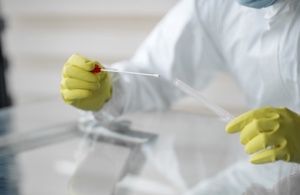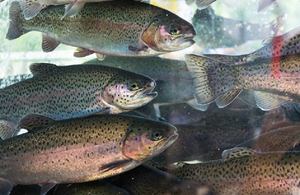-
Pilots have been run in a structured, scientifically and ethically robust way to enable events in the programme to happen at a scale not previously tested since the start of the pandemic
-
Report finds events with high crowd density and proximity could potentially pose a greater transmission risk
-
Phase three of the Events Research Programme will further examine transmission data and build on evidence base of low case rates from phase one
The government has published the report of the first phase of its ground-breaking Events Research Programme (ERP) which has helped to understand how the risk of transmission can be reduced at large events when mitigating measures are introduced.
While additional ERP events continue to gather further evidence, no decisions have been taken on the full reopening of mass events. The government will set out its position on this ahead of Step 4 in the roadmap.
The study gathered significant data on behaviour, movement, ventilation and testing and has shown that with mitigating factors, such as social distancing at pinch points, face coverings and staggered entry and exit times, events can be conducted more safely at increased capacities while maintaining a low risk of transmission.
It concluded that:
- Both indoor and outdoor events carry levels of transmission risk but ‘pinch points’ in venues where attendees may congregate for extended periods carry greater transmission risk
- Large indoor events with high crowd density and proximity may pose a higher potential risk of transmission as a result of close proximity and poor ventilation.
- Mitigations such as face coverings, ventilation, testing, restrictions on food and drink, and social distancing/capacity caps all contributed to reducing transmission risk
- Compliance with social distancing, face covering and testing requirements was generally high across all events where they were required (96.2%* of people in sampled areas were observed wearing face coverings correctly while seated during the event), particularly in indoor environments (98.3%) in comparison to events conducted outdoors or with a substantial open air element (92.1%).
- Low uptake of PCR testing before and after events meant evidence of direct transmission at events was challenging to determine.
- Nearly all CO2 levels recorded at the pilot events were within the bounds of reasonable ventilation benchmarks** with outdoor spaces clearly better for ventilation than indoors.
The ERP was commissioned by the Prime Minister in February 2021 as part of the Government’s roadmap out of lockdown, and is designed to explore how reopening of events can be conducted safely, including without social distancing, whilst limiting the transmission of COVID-19 as much as possible.
The aim of the review was to build an evidence base to inform how the public could return as safely as possible to attend events such as sport, theatre, live music and business events by conducting pilot events across a range of settings and sectors. Pilots have been run in a structured, scientifically and ethically robust way to enable events in the programme to happen at a scale not previously tested since the start of the pandemic.
The programme involved a total of 58,000 participants at venues across the country including Liverpool, Sheffield and London. It was supported by event organisers, local authority and public health teams, national and local government officials and nine scientific research teams from five UK universities. The work was overseen by an independently-chaired science and ethics board.
The phase one programme required all attendees to prove a negative lateral flow test as the condition of entry into the events. All attendees were also asked to take a voluntary pre and post event PCR test to aid the programme’s research. Pilot events tested a range of mitigating factors including staggered entry and exit times and ventilation in venues as well as testing the suspension of non-pharmaceutical interventions such as face masks and social distancing for research purposes.
The report confirms that 28 cases of Covid-19 were recorded from all available data during the ERP’s first nine events. The report acknowledges that these numbers reflect the rigorous testing regime in place for attendance at each event and relatively low levels of community prevalence of Covid-19 at the time of running the first phase of pilots. It also acknowledges that uptake of post event PCR tests, used to measure transmission, was also low.
Of these 28 cases, the report has found 11 cases were identified as potentially infectious at an event, and a further 17 were identified as potentially infected at or around the time of an event.
Indoor events including Circus nightclub, which hosted nearly 7,000 people over two nights, saw 10 cases recorded. The World Snooker Championship saw six cases recorded from over 10,000 attendees over 17 days. The BRIT Awards, which saw 3,500 people attend the event at London’s O2 Arena, recorded no cases.
All three pilot events held at Wembley Stadium, which saw a total of almost 30,000 people attend the FA Cup Semi Final, Carabao Cup Final and FA Cup Final combined saw eight cases recorded. The ERP’s outdoor festival pilot at Sefton Park, in which over 6,000 people attended saw two cases, with the Reunion 5k run at Kempton Park also recording just two cases from nearly 2,000 attendees.
Culture Secretary Oliver Dowden said:
Our innovative and science led Events Research Programme is helping us to better understand how the risk of transmission at major events can be effectively mitigated.
The findings and learnings will help event organisers plan for large audiences as we move to Step 4 of the roadmap.
I would like to thank this programme’s chief advisers Nicholas Hytner and David Ross, all the event organisers, and the scientists and researchers for their important work.
ERP Chief Advisor Nicholas Hytner said:
These events are so important for our wellbeing, our sense of community and togetherness, and they have been sorely missed.
This programme has shown that through the public demonstrating their status we have been able to track the virus, creating a safer space for the public to get back to the events they love.
The findings from the first phase of this programme will help facilitate the return of what so many of us enjoy: attending exciting and top quality events throughout the country when it is safe to do so.
ERP Chief Advisor David Ross said:
Our number one priority has been to try and get fans back into grounds, theaters and events spaces as quickly and as safely as possible.
Despite the huge challenges presented by the pandemic the events industry has worked tirelessly alongside the Government to try and make this happen.
It has been a huge team effort and the research and data that we are publishing today will be invaluable for anyone hosting an event once the economy fully reopens.
A second phase of pilot events has completed, with group stage UEFA EURO 2020 matches hosted at Wembley Stadium, the Download Pilot music festival, the England v New Zealand test match at Edgbaston and Royal Ascot having taken place this month. Research into the events is still being gathered and analysed by the ERP science team.
The government is currently in live discussions with cultural and sporting events to include them in an expanded third phase designed to further trial testing and vaccine status in the form of the NHS COVID Pass (via the NHS App) to allow crowds back safely and efficiently.
The third phase of the ERP will include Wimbledon Championships, The Open Championship, Goodwood Festival of Speed, Home and Gift 2021, Rugby League’s Challenge Cup and 1895 Cup Finals. Latitude and the Grange Opera Festival. Further events will be added in due course.
The pilots will be subject to local and national public health guidance. The findings from the events will feed into the government’s review of certification.
The pilots will continue to examine a range of settings, venue types, and activity types so that the data is generalisable, and findings can inform thinking on the reopening of similar settings across multiple sectors.
ENDS
Notes to Editors:
Phase One events included:
- April 17 – May 3: World Snooker Championships (10,150 participants)
- April 18: FA Cup Semi Final (2,800 participants)
- April 25: Carabao Cup Final (7,800 participants)
- April 28: ACC Business Event, Liverpool (150 participants)
- April 30 – May 1: Circus Nightclub (3,100 and 3,900 participants)
- May 2: Sefton Park Concert (6,100 participants)
- May 11: The BRITS (3,500 participants)
- May 15: FA Cup Final (21,000 participants)
- May 15: Reunion 5K Run (2,000 participants)
Read the full report.
Scientific studies were conducted across the nine pilots with scientists collecting and analysing significant quantities of data. Teams from the University of Liverpool, Loughborough University, University College London, the University of Edinburgh and Movement Strategies, a company that specialises in people movement and crowd dynamics, undertook research core to the ERP. These studies explored environmental factors such as ventilation and crowd movement, behavioural responses of participants, and evidence of transmission through testing of attendees. Read the research protocols in full.
*At the time of writing figures on face covering compliance in Wembley stadium’s seating bowl for the Emirates FA Cup Final were unavailable. Averages shown throughout this section are averages of individual samples, unweighted.
**As set by the Chartered Institution for Building Services Engineers (CIBSE) and based on advice from the Scientific Advisory Group for Emergencies (SAGE).

